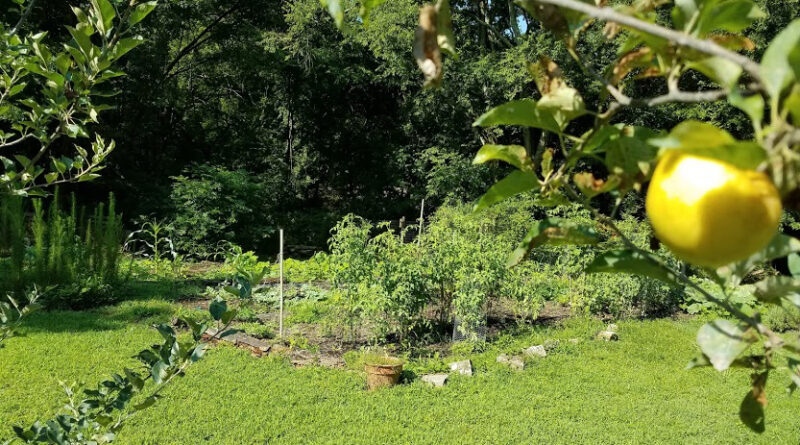More than Tomatoes for More than Groundhogs
You might have already guessed it but managing the leadership team of Grace and Main’s Urban Farm has been a challenge to me at times. For the last three years, I have been working with the Urban Farm leadership team on planning and maintaining our one-and-a-half acres of gardens, trees, and bushes. Our team is primarily made up of folks who have direct experience with homelessness, addiction, and food and housing insecurity. Some of the leaders have gardening experience, like Walter who grew up helping his grandpa tend vegetables in his backyard. Others, like Joseph and Victor, are more familiar with mowing, weeding, and trimming, having grown accustomed to it working on other people’s lawns.
Together, we have been learning about permaculture, chemical-free growing, and companion planting to expand access to fresh food in a neighborhood that isn’t close to a grocery store. We have developed some routines and strategies that have worked, but we’ve also lost a lot of produce to groundhogs and other pests. Sure, we’ve grown plenty of food to share, but we have been perhaps too generous with the groundhogs.
Managing the Urban Farm is an odd fit for me. I love to garden, but, as a student, I never liked group projects. To me, it always seemed that incorporating a variety of ideas, delegating, and relying on others to complete parts of an assignment was far harder than just doing the assignment by myself. Group projects made me anxious and I worried that others would turn in work that wasn’t good enough. Obviously, giving up control was difficult for me. I was afraid to be judged by someone else’s work instead of my own.

So, it perhaps comes as no surprise that, through most of my time managing the Urban Farm, I have kept my hands “on the wheel.” I’ve directed others on how to plan and plant a bed, how to spread what kinds of compost and when, where and when to spray our fish fertilizer, how to prepare our “all-purpose spray,” and where the weed-eaters should and should not be used in the gardens. But my practiced tendency to want to control a project has come up against something more fundamental: our community’s commitment to sharing power and trusting directly affected people to do the work.
In our work over the last decade, I have seen the effect of giving power into the hands of people who are most directly affected by a problem. When Bruce, recently sober and in stable shelter for the first time in a while, wanted to help provide his neighbors with tools to support themselves, Grace and Main gave him the resources to start a Tool Library and eventually grew it into an entirely new building. When residents in the North Main Street neighborhood decided to provide their neighbors with breakfast and fellowship on the lawn one day a week, Grace and Main bought eggs and coffee, dropped off pallets of bread, and showed up to help cook. When neighbors wanted to grow produce in their yards, Grace and Main secured a grant to build garden beds. In all of these situations, Grace and Main found a way to pitch in while still leaving the power to make decisions and plans in the hands of local people who knew intimately and personally what it was that their community really needed. I have seen it work, but still it has been difficult for me to trust others and give them the power to make more decisions at the Urban Farm, but that’s been changing. I was still afraid to be judged by someone else’s work instead of my own. I still am.
Our garden leadership team has fluctuated over the years, mostly for good reasons like new jobs and leaders having new opportunities, but occasionally because of a death or other loss. Then, of course, COVID-19 caused us to have to rethink everything about how we work. We had to cancel the first 2 months of our season during the statewide stay-at-home period. Then when we did finally start our weekly workdays in June, I could only take half of the team at a time to ensure that we were safely socially distanced in the community van. About half of the garden was left to rest because we didn’t have enough time between us to maintain it all. Every new challenge left me feeling more and more like the garden wouldn’t be able to run without my direct leadership at every step.
Every winter, we gather to plan the year’s work and start preparing the beds for the spring. This winter has been no exception as we’ve learned how to run our gardens during the middle of a pandemic. At one of those recent workdays, Draymond took a step back from a garden bed that had been particularly plagued by groundhogs last year and said, “I wonder if building raised beds would help keep the groundhogs from eating everything.” Somehow in all our years of doing this, I had never thought about building raised beds on top of our terraced beds to help protect from pests. Draymond did though.

As we worked together to plan how to place the beds and how to cover them with chicken wire to slow down the groundhogs, I was reminded about the real power that comes from sharing our power. Draymond helped situate the raised beds and figure out spacing, while Joseph started to describe a way to assemble the lumber that would keep the weather-treated corner posts on the outside away from the soil. Walter interjected with an idea about how to use rebar and PVC to create a structure to support the fencing. Ideas and innovation were flowing unsolicited; it was a welcomed relief! After holding so tightly to the garden for so long, sharing that power felt like taking a breath after being under water for too long. It felt good to rely on someone else’s work; it would be good to be judged by the work of others, because when we share our power we make room for the right leadership.
My goal since I took over the management of the Urban Farm three years ago has been to work myself out of a job. I know that, as has been the case so many times before, the Urban Farm will be even better when it is not only led but managed by people who are most directly affected by food insecurity in the neighborhood. This year, I am finally allowing myself to feel that this is true and to imagine what it will be like to give even more power away. On the day that I am joyfully demoted from manager to volunteer, I will be thankful to be judged by someone else’s work. I have hope that that day will be coming soon and that it will involve far fewer groundhogs.

